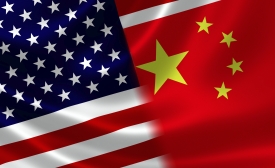trans-pacific partnership
President Barack Obama will be making good use out of Air Force One while he still can. [...] The travel will be aimed at cementing a foreign policy legacy he hopes will include the Trans Pacific Partnership, increased attention to Asia, an opening of Latin America, progress on ISIL and significant global movement on climate change.
The dominant perception is that the TPP is the commitment of the United States to Asian-Pacific relations, as well as an assertion of America’s trade and security rules and norms in a region increasingly influenced by China. This perception works well to positively influence the U.S’ Asian partners. But for its North American partners, Mexico in particular, the U.S’ rhetoric is different.
This new video from BBC News unpacks what the TPP means for participating nations and the global economy as a whole.

Jay Wang on why public diplomacy between the two superpowers is more crucial than ever.
Outside the White House, demonstrators protested against human rights violations in Vietnam, while a group of US lawmakers wrote an open letter to Mr Obama complaining about the invitation.
Remember the pivot to Asia? The big signature move of first-term Obama foreign policy? Some called it a “strategic rebalancing.” We were going to reset our priorities, put the conflicts of the Middle East behind us, and devote big efforts to creating and implementing a strategy to deal with the vital strategic moves America needed to make to account for the rise of the world’s fastest-growing region.
Without much fanfare, Malaysia assumed the chairmanship of Asean at the recent summit of the regional grouping in Myanmar. From this vantage point, there is much the country can do in moving the larger aims of the new Asean.
On Friday the Pacific Realist had the opportunity to participate in a panel discussion on applying American power that was hosted by the Atlantic Council’s Brent Scowcroft Center on International Security. The other panelists were Brent Scowcroft Center Director Barry Pavel; Jones Group International Senior Associate Jeff Lightfoot; RAND Political Scientist Stacie Pettyjohn; andJohn Hudson, a staff writer for Foreign Policy and one of The Cable guys, who moderated the conversation.







